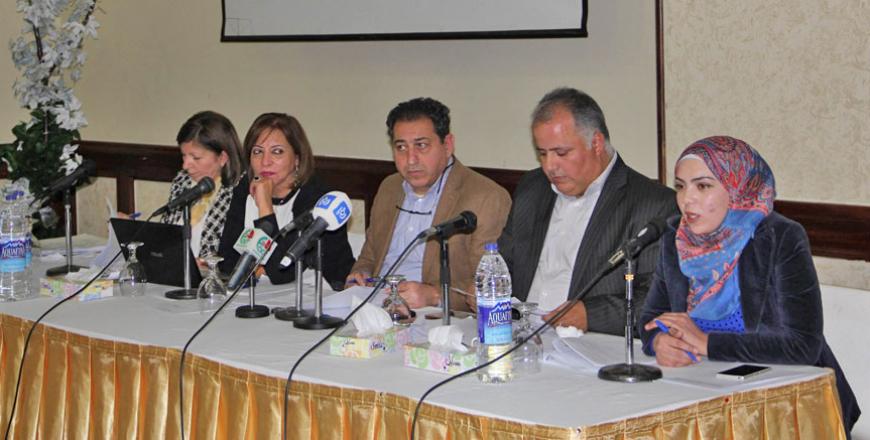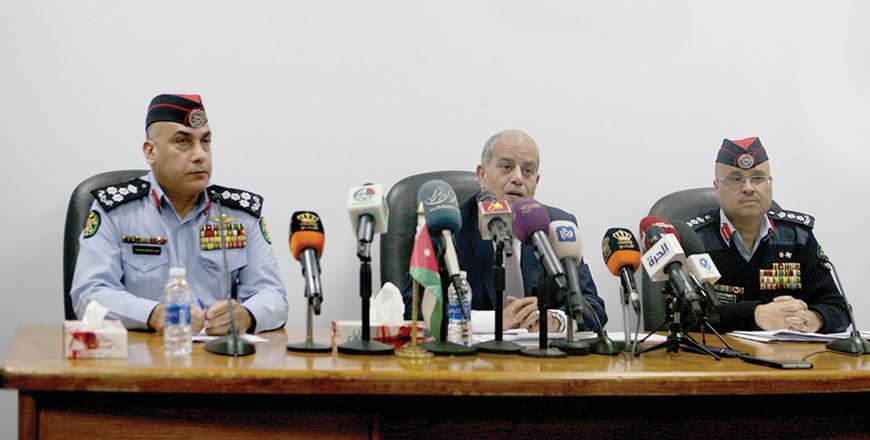You are here
Panel calls for adopting definition of torture in line with int'l convention
By Laila Azzeh - Dec 22,2015 - Last updated at Dec 26,2015

Representatives of the Jordanian Civil Coalition against Torture hold a press conference in Amman on Tuesday (Photo courtesy of Jo-CAT)
AMMAN — A national alliance of civil society organisations on Tuesday called on the government to take several measures to improve the human rights environment to ensure that it is in line with Jordan's international obligations.
The Jordanian Civil Coalition against Torture (Jo-CAT) urged the government to consider the recommendations made by the Committee against Torture in its 56th session last month, saying that the vast majority of observations had been made years ago but "fell on deaf ears".
The committee “is the body of 10 independent experts that monitors implementation" of the Convention Against Torture and Other Cruel, Inhuman or Degrading Treatment or Punishment by its state parties, according to the website of the Office of the High Commissioner for Human Rights.
In November, the committee reviewed the Kingdom's implementation of the convention.
Jo-CAT submitted shadow reports to the committee prepared by its members, which include the Jordanian Society for Human Rights, Adaleh Centre for Human Rights Studies, Tamkeen Fields for Aid, Centre for Defending the Freedom of Journalists (CDFJ), and the Jordanian Civil Coalition against Torture.
At a press conference held to announce the observations of the UN committee, members of the coalition said more than 80 per cent of the observations of the panel were "repeated from the Human Rights Committee in 2010".
"We appreciate the government's measures to combat torture and eliminate it, but at the same time we are observing with immense concern the continuation of such violations and impunity of the perpetrators," Jo-CAT said in a statement, calling for ratifying the Optional Protocol to the Convention against Torture and other Cruel, Inhuman or Degrading Treatment or Punishment.
The coalition suggested creating a mechanism that coordinates efforts to implement the committee's recommendations in cooperation between the government and civil society.
On the bright side, the UN committee's observations shed light on some of the positive steps taken by Jordan in relation to combating torture.
The panel commended the Kingdom for adopting legislation in relevance to the convention, such as laws on juveniles, independence of the judiciary and the Constitutional Court.
It also welcomed the establishment of a national register for cases of torture at public prosecution offices, the adaptation of the National Strategy to Combat Human Trafficking and the holding of two international conferences on torture prevention and alternatives to pre-trial detention.
However, the committee cited many shortcomings, with the major one being Jordan's definition of torture, calling for adopting one that covers all elements outlined in the convention and ensures that torture is a crime rather than a misdemeanour.
Furthermore, the panel directed the government to "ensure that the principle of absolute prohibition of torture is incorporated in its legislation and ensure its strict application in accordance with the convention".
"The state party should ensure that an order from a superior officer may not be invoked as a justification of torture, and to this end establish a mechanism for the protection of subordinates who refuse to obey such an order," the UN committee said.
"Jordan willingly ratified the convention against torture and this obligates it to take all measures to ensure its implementation…," CDFJ President Nidal Mansour said at the press conference.
As for administrative detention, the committee urged the government to ensure that all detainees are afforded fundamental legal safeguards, while intensifying efforts to reduce the number of inmates placed in pre-trial detention.
"There were more than 2,000 guest workers held in administrative detention between the years 2011 and 2013, all of whom did not know the reason behind their arrest, while the period of their detention ranged between 21 days and two years," said Tamkeen Executive Director Linda Kalash.
She added that the committee expressed its concern over the "inseparable legislative and legal powers when it comes to administrative detention and how the governor is given the power to hold people in detention".
The panel "reiterated its previous recommendation to abolish the practice of administrative detention, including and in particular against holding women and girls who are victims of violence in protective custody as well as migrant workers who have fled abusive employers".
On the other hand, the panel said it was "alarmed" by the several cases of death of inmates in custody in 2015, calling for expediting investigations into all cases of deaths in custody and bringing perpetrators to justice.
"The state party should ensure that the Jordan National Centre for Human Rights is granted access to all facilities of detention and is able to carry out unannounced and regular visits to all such facilities," the committee said.
"Alternatively, the state party should establish an independent monitoring mechanism mandated to carry out regular and unannounced visits to all places of detention."
The panel also called for abolishing the State Security Court in line with the recommendation put forward by the Human Rights Committee in 2010.
Related Articles
AMMAN — Deemed a crime against human dignity and a grave violation of human right principles, torture must become a socially rejected practi
AMMAN — The government’s coordinator on human rights, Basil Tarawneh, on Wednesday said human rights groups and activists will be allowed to
AMMAN — Some individual cases of torture cannot be elevated to the status of "systematic approach" by the state and it is unfair to make a g













